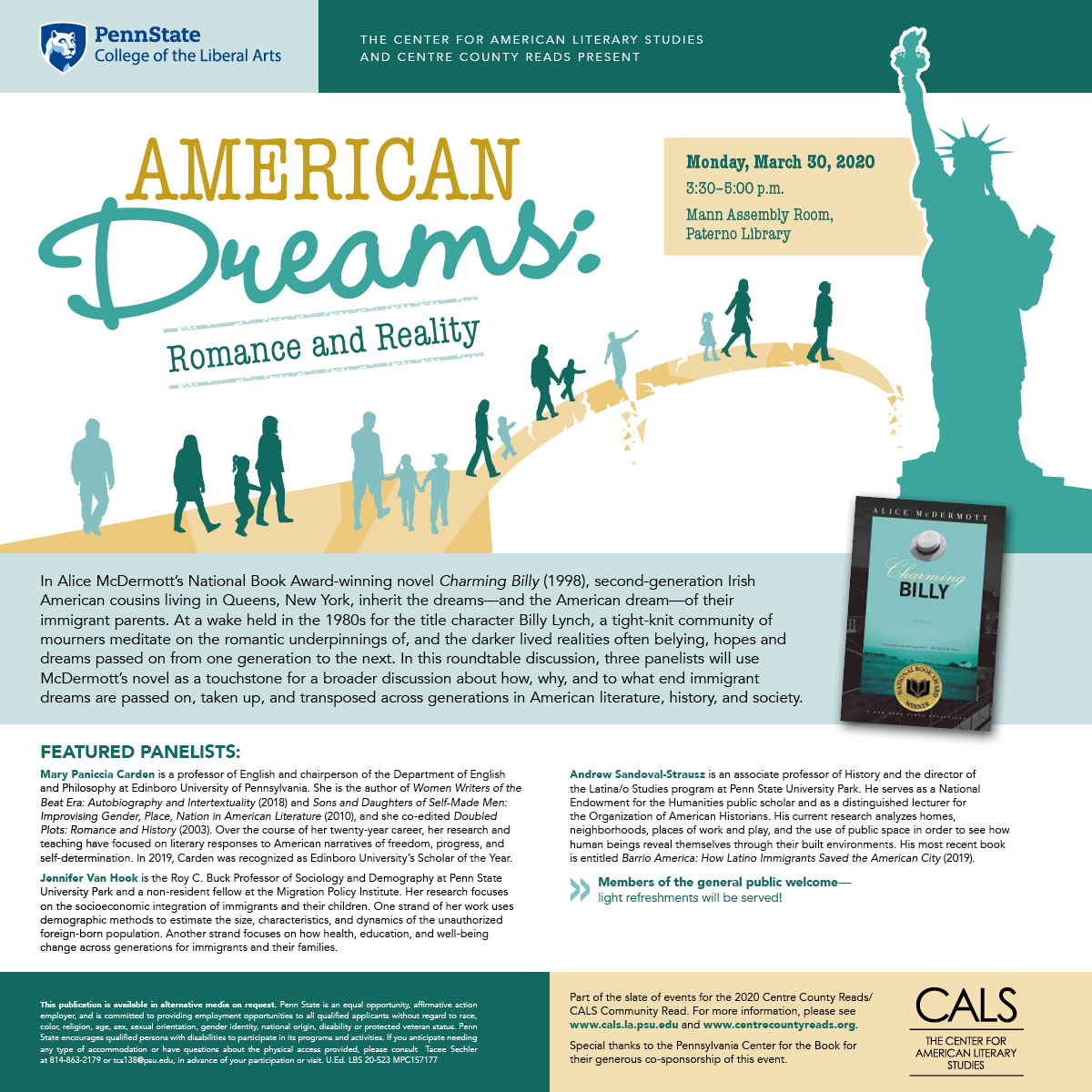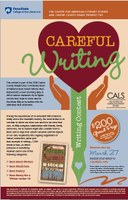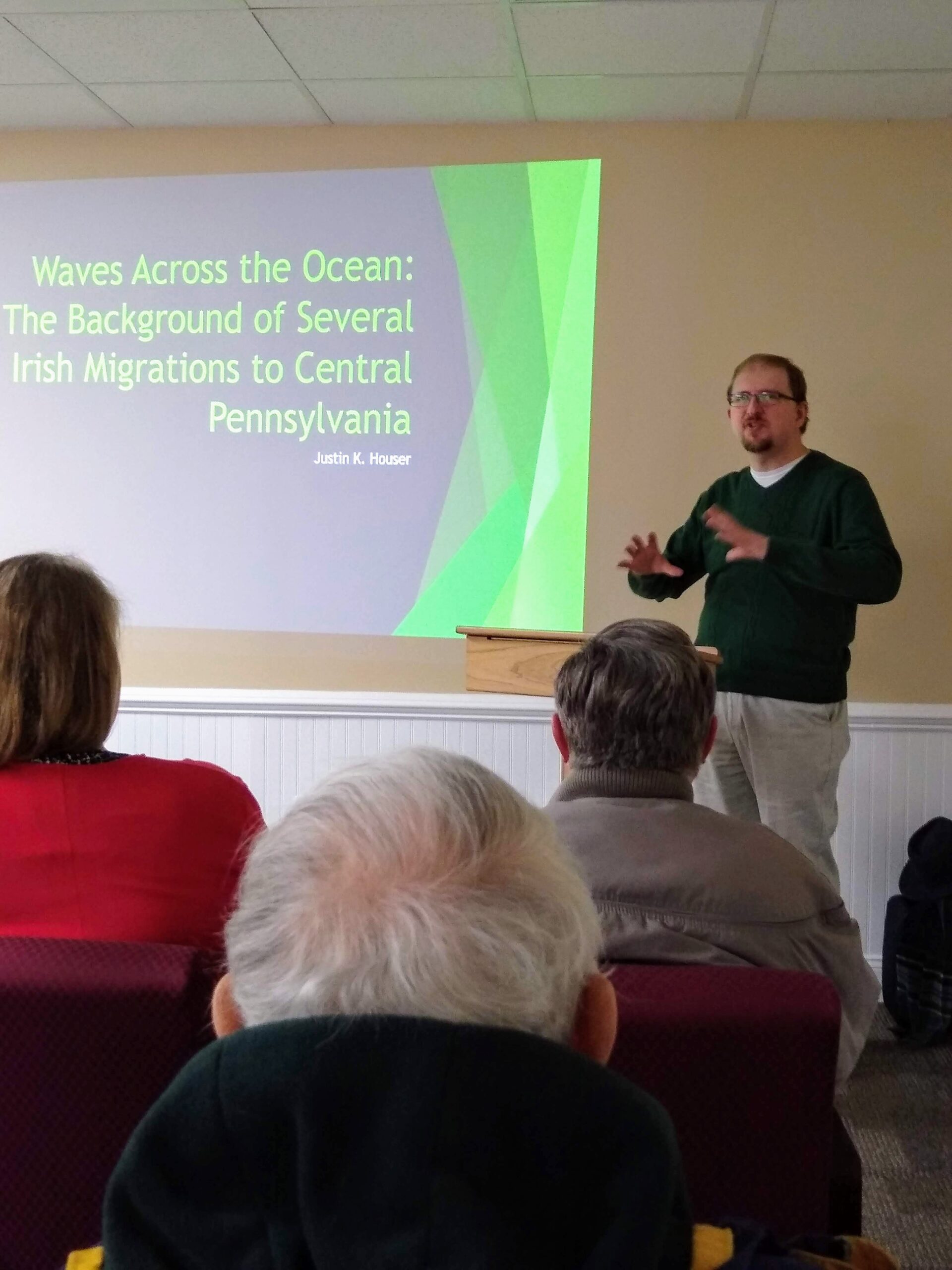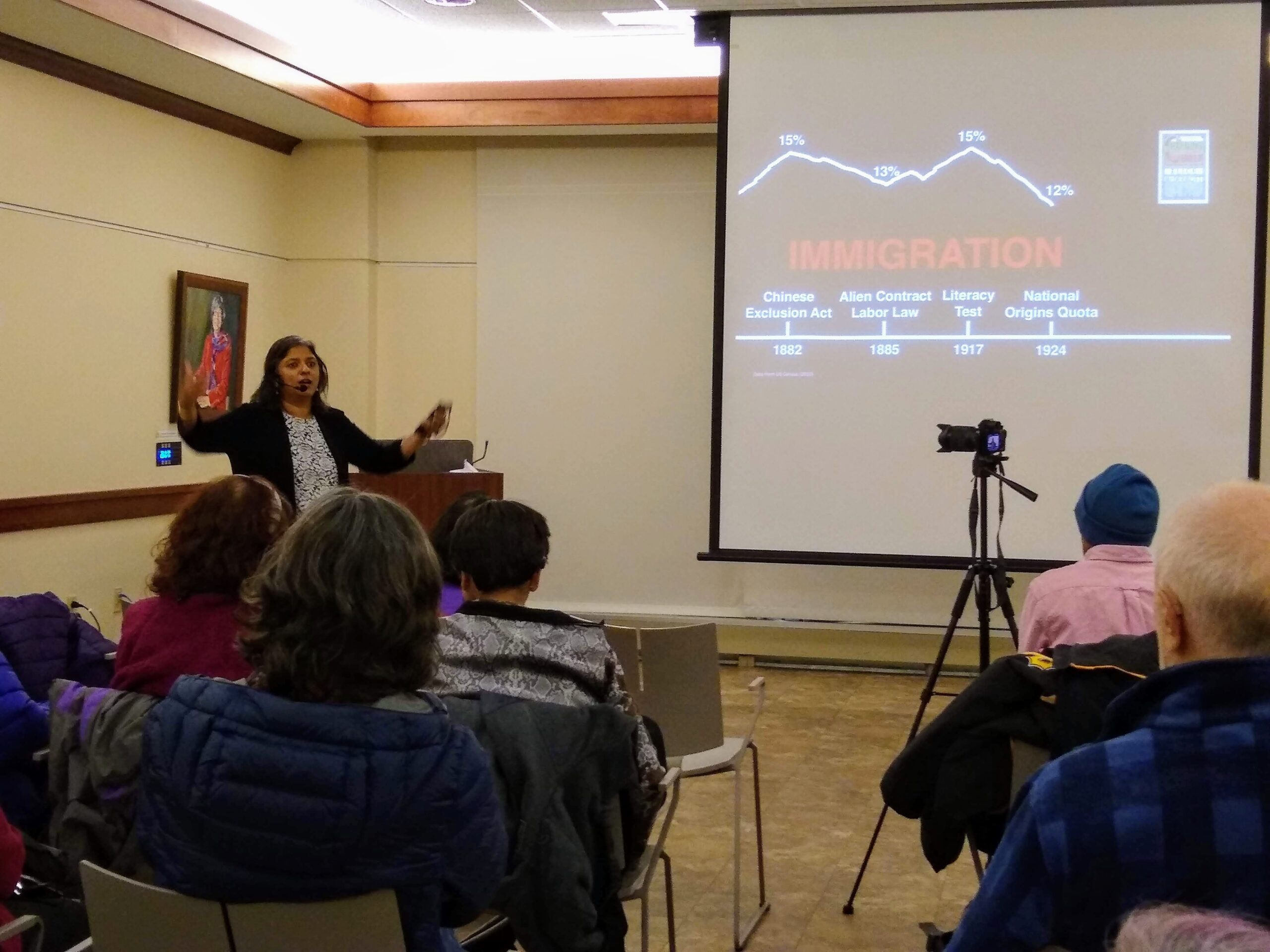A Wake for Billy Lynch and the 2020 Community Read

What makes Charming Billy by Alice McDermott so charming? More than a compelling and unique story about the hopes and memories of the troubled protagonist Billy Lynch and the twentieth-century Irish American community of which he is a part, in poignant ways the novel treats the legacy of immigration and its effects on subsequent generations, as well as the challenges of caring for and sustaining others in a time of crisis. Charming Billy was the focus of the 2020 Centre County Reads slate of programming, organized once more this year by CALS and the Centre County Public Library system. However, due to the unfortunate and unforeseen circumstances of COVID-19, this year’s Community Read ended differently than previous years, perhaps capturing the essence of Charming Billy in surprisingly effective ways. Just like Billy’s life, our events were interrupted rather abruptly, bringing planning, gathering, and celebrating to a halt much like Billy’s dreams to marry the woman he loved are ultimately not realized. Instead, CALS and the wider Centre County community are having our own wake for what the year was supposed to hold, similar to how the relatives of Billy at the outset of the novel look back on the interrupted life of one who lost his struggle with disease. Things can change so fast, but rather than focus on the negative aspects of what we are witnessing across the world, we can choose to focus on what makes our time worthwhile: our own impact on people and their lives.
The Community Read began with a memorable kick-off event held on February 8 at the Green Drake Gallery and Arts Center in Millheim. The band Callanish not only played songs to show the spirit of Ireland, Scotland, and the British Isles--similar to those that would have been played at Billy’s wake--but also explained their musical instruments and the evolution of Irish music upon immigrants’ arrival to the United States. Callanish band members Patty Lambert, Betsy Gamble, Holly Foy, and Louisa Smith took turns educating the audience on multiple Irish instruments while giving homage to Irish and Scottish songs that have been played for centuries. This event truly invoked the spirit of Billy’s story; just as readers of Charming Billy learn of Billy’s ancestors, his parents' immigration, and how he navigates the fusion of the newfound American culture with his Irish bloodline, so too did listeners learn about a history of Ireland that traveled across space and time into modern day America.
After showcasing musical excellence, the Community Read next featured a lecture by local historian and genealogist Justin Houser at the Holt Memorial Library in Philipsburg. Giving a talk titled “Waves Across the Ocean: The Background of Several Irish Migrations to Central Pennsylvania,” Houser spoke on why immigrants left Ireland behind and looked ahead to the United States for brighter horizons. Factors he spoke of included declining economic conditions, which began one wave of immigration in 1820. Subsequently the Great Famine of 1845-1849 led to the deaths of one million Irish and the immigration of one million more to the United States. Alongside explaining why they left, Houser discussed where the immigrants chose to settle, focusing especially on Central Pennsylvania to more closely connect with his audience.
The final event that the Community Read was able to host was held at Schlow Library in downtown State College and featured Dr. Nalini Krishnakutty. Dr. Krishnakutty’s lecture, “Re-Viewing History: Centering the Stories of Immigrants,” reviewed stories of migration and arrival to the United States. She told her audience that though they may differ from one another, each immigrant’s story bespeaks a unique human being. Krishnakutty emphasized that the US is a land of immigrants who coexist and by so doing demonstrate that there isn’t one way to be an American. Dr. Krishnakutty summed up her lecture by provocatively relating its theme to McDermott’s novel, suggesting that when you center the stories of immigrants, and get to see and know them, each and every one of them “becomes as human as Billy.”
As Billy and his family faced challenges of sustaining their traditions and one another, we have also faced our issues concerning COVID-19. The final events planned for the 2020 Community Read did not come to fruition owing to the interruption of the semester due to the pandemic. The next event on the agenda for the Community Read was to have been a CALS-sponsored roundtable discussion entitled “American Dreams: Romance and Reality,” featuring several distinguished panelists with the aim of provoking a broader conversation about how, why, and to what end immigrant dreams are passed on, taken up, and transported across generations in American literature and history.

The much-anticipated culminating event for this year’s read would have “An Evening with Alice McDermott.” McDermott was to come to Penn State in late April and read from her distinguished works in addition to signing books and answering readers’ questions concerning Billy, his legacy, and what readers can learn from his story today. McDermott would also have awarded the prizes to the winners of this year’s CALS-sponsored “Careful Writing” writing contest. Inspired by the ongoing demonstrations of human connection in Charming Billy, entrants were invited to submit their best work in which “someone or something receives care.” Contest winners and their award-winning entries can be found here.
Even though the Community Read was not what we had hoped it would be, it was still an unforgettable experience. Though we mourn the loss of an end to an academic year and its specialized events, it’s hard not to connect the COVID-19 experience with that of mourning the loss of Billy Lynch in the novel, who ultimately succumbs to his alcohol addiction. However, we, along with Billy’s family, are able to celebrate the spirit of life and togetherness amid a world of uncertainty. Rather than break apart, both the novel’s community and ours are able to come together to reflect on this tragedy and potentially learn from it, looking at the lasting effects of one person, or one unexpected virus.


What makes Charming Billy by Alice McDermott so charming? More than a compelling and unique story about the hopes and memories of the troubled protagonist Billy Lynch and the twentieth-century Irish American community of which he is a part, in poignant ways the novel treats the legacy of immigration and its effects on subsequent generations, as well as the challenges of caring for and sustaining others in a time of crisis. Charming Billy was the focus of the 2020 Centre County Reads slate of programming, organized once more this year by CALS and the Centre County Public Library system. However, due to the unfortunate and unforeseen circumstances of COVID-19, this year’s Community Read ended differently than previous years, perhaps capturing the essence of Charming Billy in surprisingly effective ways. Just like Billy’s life, our events were interrupted rather abruptly, bringing planning, gathering, and celebrating to a halt much like Billy’s dreams to marry the woman he loved are ultimately not realized. Instead, CALS and the wider Centre County community are having our own wake for what the year was supposed to hold, similar to how the relatives of Billy at the outset of the novel look back on the interrupted life of one who lost his struggle with disease. Things can change so fast, but rather than focus on the negative aspects of what we are witnessing across the world, we can choose to focus on what makes our time worthwhile: our own impact on people and their lives.
The Community Read began with a memorable kick-off event held on February 8 at the Green Drake Gallery and Arts Center in Millheim. The band Callanish not only played songs to show the spirit of Ireland, Scotland, and the British Isles--similar to those that would have been played at Billy’s wake--but also explained their musical instruments and the evolution of Irish music upon immigrants’ arrival to the United States. Callanish band members Patty Lambert, Betsy Gamble, Holly Foy, and Louisa Smith took turns educating the audience on multiple Irish instruments while giving homage to Irish and Scottish songs that have been played for centuries. This event truly invoked the spirit of Billy’s story; just as readers of Charming Billy learn of Billy’s ancestors, his parents' immigration, and how he navigates the fusion of the newfound American culture with his Irish bloodline, so too did listeners learn about a history of Ireland that traveled across space and time into modern day America.
After showcasing musical excellence, the Community Read next featured a lecture by local historian and genealogist Justin Houser at the Holt Memorial Library in Philipsburg. Giving a talk titled “Waves Across the Ocean: The Background of Several Irish Migrations to Central Pennsylvania,” Houser spoke on why immigrants left Ireland behind and looked ahead to the United States for brighter horizons. Factors he spoke of included declining economic conditions, which began one wave of immigration in 1820. Subsequently the Great Famine of 1845-1849 led to the deaths of one million Irish and the immigration of one million more to the United States. Alongside explaining why they left, Houser discussed where the immigrants chose to settle, focusing especially on Central Pennsylvania to more closely connect with his audience.
The final event that the Community Read was able to host was held at Schlow Library in downtown State College and featured Dr. Nalini Krishnakutty. Dr. Krishnakutty’s lecture, “Re-Viewing History: Centering the Stories of Immigrants,” reviewed stories of migration and arrival to the United States. She told her audience that though they may differ from one another, each immigrant’s story bespeaks a unique human being. Krishnakutty emphasized that the US is a land of immigrants who coexist and by so doing demonstrate that there isn’t one way to be an American. Dr. Krishnakutty summed up her lecture by provocatively relating its theme to McDermott’s novel, suggesting that when you center the stories of immigrants, and get to see and know them, each and every one of them “becomes as human as Billy.”
As Billy and his family faced challenges of sustaining their traditions and one another, we have also faced our issues concerning COVID-19. The final events planned for the 2020 Community Read did not come to fruition owing to the interruption of the semester due to the pandemic. The next event on the agenda for the Community Read was to have been a CALS-sponsored roundtable discussion entitled “American Dreams: Romance and Reality,” featuring several distinguished panelists with the aim of provoking a broader conversation about how, why, and to what end immigrant dreams are passed on, taken up, and transported across generations in American literature and history.

The much-anticipated culminating event for this year’s read would have “An Evening with Alice McDermott.” McDermott was to come to Penn State in late April and read from her distinguished works in addition to signing books and answering readers’ questions concerning Billy, his legacy, and what readers can learn from his story today. McDermott would also have awarded the prizes to the winners of this year’s CALS-sponsored “Careful Writing” writing contest. Inspired by the ongoing demonstrations of human connection in Charming Billy, entrants were invited to submit their best work in which “someone or something receives care.” Contest winners and their award-winning entries can be found here.
Even though the Community Read was not what we had hoped it would be, it was still an unforgettable experience. Though we mourn the loss of an end to an academic year and its specialized events, it’s hard not to connect the COVID-19 experience with that of mourning the loss of Billy Lynch in the novel, who ultimately succumbs to his alcohol addiction. However, we, along with Billy’s family, are able to celebrate the spirit of life and togetherness amid a world of uncertainty. Rather than break apart, both the novel’s community and ours are able to come together to reflect on this tragedy and potentially learn from it, looking at the lasting effects of one person, or one unexpected virus.


